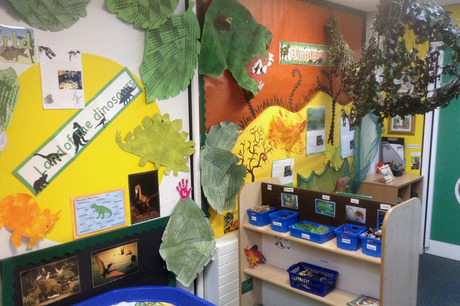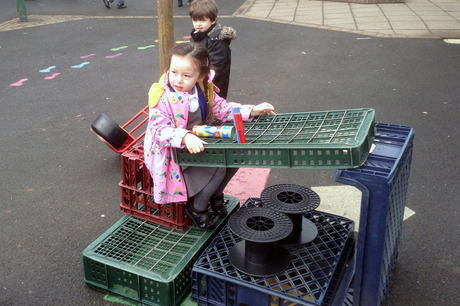
Mills Hill Primary School in Oldham has a national reputation for excellence and high levels of achievement, something that head teacher and former primary school adviser Ian Mason says is due to the school’s efforts to foster co-operative learning from the earliest age.
‘The thing that I think separates us and contributes massively to our Outstanding status and results is our heavy investment in continuing professional development around co-operative learning,’ says Mr Mason. ‘Our youngest children are used to co-operative learning situations and work routinely with partners or participate in group activities.’
Mills Hill, which boasts some of the highest Key Stage 2 SATs results in the country, was one of the first schools to be designated a National Teaching School (NTS) in 2011. It operates as part of the regional alliance Schools with Schools and offers initial teacher training through Leeds Beckett University, having trained almost 100 new teachers in the past five years.
KAGAN STRUCTURES
The school ensures all staff are trained to teach using Kagan Structures, an approach that aims to make learning active by encouraging all children to participate to the best of their ability. The Structures are in operation throughout the school, starting in the early years, where children routinely work with partners and in groups in order to develop their interpersonal skills and learn how to work co-operatively with others.
This is something Mr Mason believes is at the heart of successful learning. ‘I think schools need to concentrate on not just what they have to teach through the curriculum but what sort of individuals they want to leave our schools aged 11. I think that’s where the focus should be and it’s obviously very difficult to focus on that in the current education landscape, which is predicated on knowing facts.
‘As a school that has outstanding results and is therefore less scrutinised than most, we are in the privileged situation to say that clearly we value reading, writing and maths and maintaining standards in those subjects, but we also give equal value to other things. What will get our children by in life will not be a fact, it will be a skill that they have acquired – that’s what will make them future leaders. By the time our children leave us at the end of Year 6, they have phenomenal skills in group learning.’
As well as teaching children the skills to work together, Mills Hill places much emphasis on developing children’s personal, social and emotional skills. Mr Mason says this approach is very much rooted in the ethos of the EYFS Characteristics of Effective Learning.
‘Our entire school is structured around our vision, which is best summed up as “enquiring minds and caring hearts”. We want all our children to develop a love of learning and a drive and desire to continually want to be better.
‘We place high priority on developing the ability to work co-operatively and to treat everyone respectfully,’ he explains.
CONSCIOUS DISCIPLINE
The school has adopted an approach to classroom management called Conscious Discipline, which aims to develop self-discipline within children so they are able to recognise for themselves what is expected rather than be told by someone else.
Foundation Stage lead Judy Ivell says this approach begins with the children in the nursery. ‘The idea is to give the children the vocabulary they need to be able to settle minor conflicts so they are able to resolve them rather than always coming to the teacher. But if they do need help we give them positive choices. In the past, such choices were usually “do this or die” – not really too positive. Whereas now, for example, when we are clearing up the Duplo, we might say, “Do you want to put the red or blue blocks in the box first?” So, the children are doing what they should but choosing how, and it works. It’s all to do with building a school family and we’re all in it together, and that follows right the way through from nursery up to Year 6.’
Mrs Ivell says every classroom in the school also has a safe place where children can go when they are feeling angry, upset or frustrated. ‘It’s a place they can take themselves to, where they can do breathing exercises and calm down. There are various things in there for the children to help comfort them,’ she adds.
GOOD EXAMPLE
Mills Hill offers leadership training in partnership with Edge Hill University to professionals in schools within the local authority and beyond. This includes a range of CPD opportunities that specialise in behaviour management and co-operative learning, as well as good practice visits to showcase outstanding EYFS provision and continuous provision in Year 1.
‘Last year a school from Birmingham found out about us and brought their entire staff up to see our Foundation Stage provision,’ says Mr Mason. ‘More often though it tends to be local schools that send their Early Years Foundation Stage lead and support staff to see our practice.
‘We actually have more requests for the Year 1 continuous provision, so they can see how it works. There are more schools now operating continuous provision in year groups other than Reception – I know some schools that are operating it right through school.’
He explains that Mills Hill is currently in the process of growing to become a three-form entry primary school, and has a 52-place nursery as well as three Reception and Year 1 classes with a total of 90 children in each year group.
The Year 1 learning environment is very similar to that in Reception, with three classrooms that each leads out to an area of carefully planned continuous provision. All Year 1 children have access to this area regularly throughout the day and are given the opportunity to engage in child-initiated activity.
‘Our school is quite proactive in developing really good continuous provision,’ adds Mrs Ivell. ‘We are very much centred around child-initiated learning. We’ve got the Foundation Stage ethos moving through into Year 1. This includes outdoor provision, which I think is very important.
‘It’s a massive shock to the system for small children, particularly if they’ve been so used to the Foundation Stage classroom and choosing their own learning. To go from that to sitting in seats is a big upset when they move from Foundation Stage into Key Stage 1. We make transition as smooth as possible.
‘We’ve got experienced staff in Year 1 who have also worked in early years so they’ve got that understanding as to what it should look like. We obviously work very closely with them so that things do evolve, and you have got progression because you need to be showing that. You can’t have the same provision that you have in nursery in Reception and in Year 1. There are more challenges as the children go through into Year 1.’
NEXT STEPS
Mr Mason says the school is currently awaiting approval from the local authority to roll out a bespoke course for early years leaders across the area. ‘We work very closely with the Oldham alliance of primary schools and our focus is really on trying to provide localised solutions to local problems. Early years is an issue across Oldham and one of the solutions is to explore leadership training for the early years Foundation Stage leads.
MORE INFORMATION
Mills Hill Primary School, www.millshill.oldham.sch.uk
Schools with Schools, www.schoolswithschools.co.uk
Kagan UK, www.kagan-uk.co.uk
Conscious Discipline, http://consciousdiscipline.com
Teaching Schools Council, http://tscouncil.org.uk
How to get involved in the NTS programme, www.gov.uk/government/collections/teaching-schools-and-system-leadership-how-you-can-get-involved









